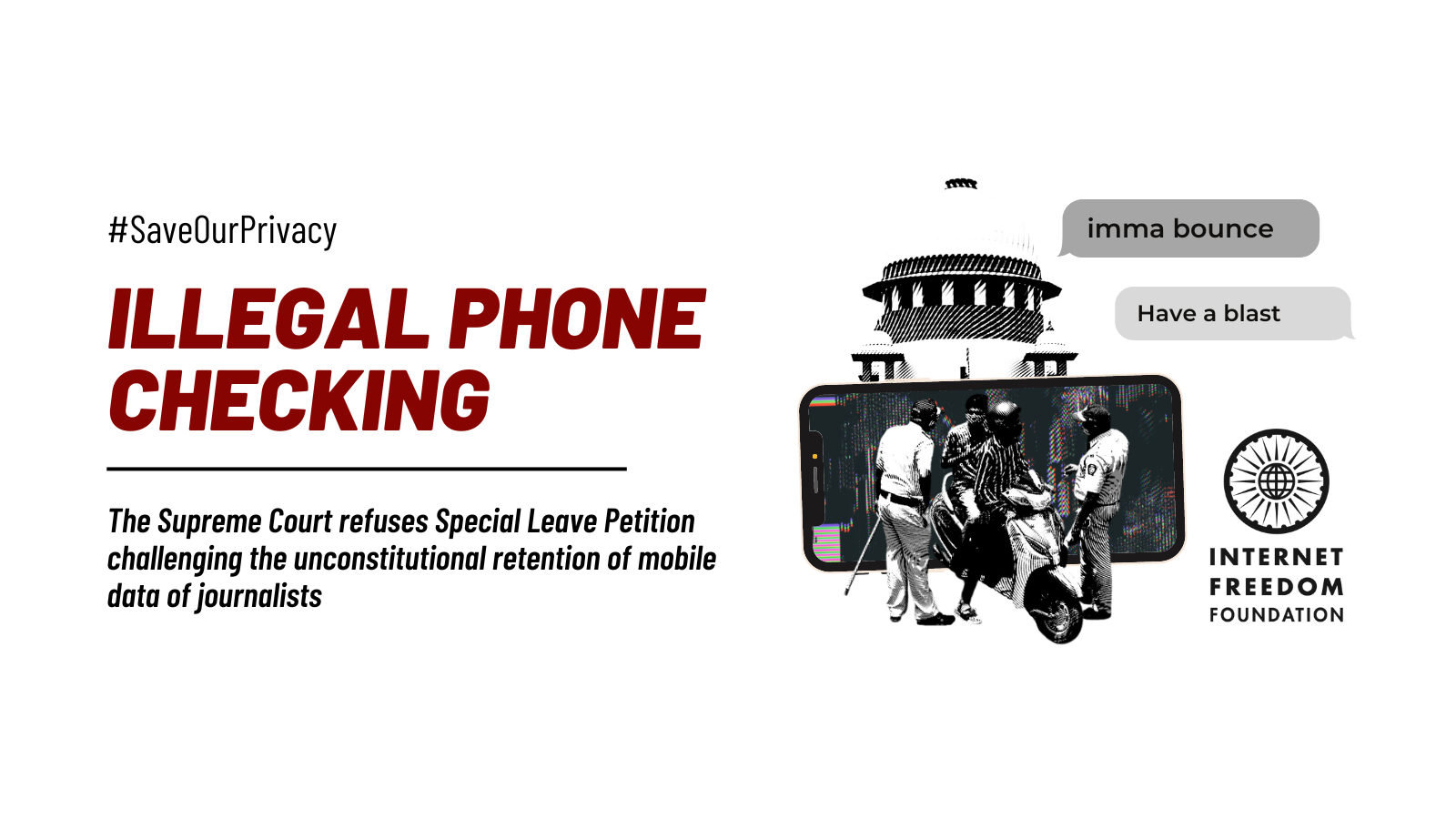The Supreme Court refuses Special Leave Petition challenging the unconstitutional retention of mobile data of journalists

tl;dr
In December 2022, P. Vaishnavi, a freelance journalist, approached the Supreme Court challenging the order of the High Court of Madras that directed the trial court to keep a copy of all necessary content and data from her mobile phone, without providing any safeguards. In the petition, it was highlighted that passing such a direction without any accompanying safeguards with respect to storage and sharing of data, insufficiently protects the individual’s constitutional rights. Further, such a broad based direction is an impermissible violation of the rights to privacy and against self incrimination. Disappointingly, the Supreme Court was not inclined to issue notice in the petition and dismissed it on 12.02.2023.
Why should you care?
Today, journalists store all their contacts and conversations on their mobile device, and have an inalienable need for privacy of such devices. Blanket orders allowing Trial Courts to copy and store the entirety of a journalist’s mobile phone data has a devastating impact on the right to privacy, the right to speech, a free press, and the integrity and safety of a journalist’s sources.
Background
P. Vaishnavi is a freelance journalist who has written for various print and digital publications on issues of labour law and workers’ rights. On December 18, 2021, she was one of many journalists covering peaceful protests by female workers near the FoxConn i-Phone facility at Oragadam, Chennai. The protests were violently broken up by local police and in the course of which, the Petitioner, along with several other women were taken into custody and detained. Her personal belongings, including the mobile phone in question, were seized by police and she was intimidated and coerced into unlocking all the folders on her phone's internal storage, her messaging and chat conversations and her social media accounts such as WhatsApp Groups. Thereafter, curiously, she was named as one of the female workers and was wrongly arraigned as an accused in an FIR, where investigation is purportedly pending and a chargesheet is yet to be filed.
She filed an application before the Trial Court under Section 451 of the Criminal Procedure Code, 1973 in an attempt to seek custody of her mobile phone which had been illegally and unlawfully seized by the Tamil Nadu Police. However, the Trial Court dismissed her application.
The Madras High Court cements the deprivation of the journalist’s privacy
To challenge the dismissal of her application, the Petitioner filed a criminal revision petition before the High Court of Madras. While the High Court of Madras partly allowed the revision petition granting the Petitioner custody of her phone - this was made subject to the condition that “before handing over the mobile phone, if any of the data and contents are necessary, the trial court can copy the same in their system.”.
The High Court of Madras exacerbated the illegal nature of the seizure and search of her mobile phone by placing an unconstitutional condition upon her. Only by agreeing to a deprivation of her right to privacy and right against self incrimination, could the Petitioner be entitled to a return of her mobile phone. The High Court not only failed to recognise that if the seizure of a digital device is outside the purview of the law, then a person is entitled to custody of their property but also enabled copies of the contents of her phone to be retained by the Trial Court.
It is in challenge of the High Court’s findings that the present special leave petition was filed before the Supreme Court. The ability of the trial court to clone the contents of her phone if the trial court deemed it “necessary” without any safeguards on its use or retention is illegal and an overbroad intrusion into her right to privacy.
Proceedings before the Supreme Court
IFF has provided legal assistance and representation to the Petitioner before the Supreme Court. We argued that passing such a direction without any accompanying safeguards with respect to storage and sharing of data, insufficiently protects the individual’s constitutional rights. Further, such a broad based direction is an impermissible violation of the rights to privacy and against self-incrimination.
The Supreme Court heard the petition on 12.02.2023, but disappointingly, was not inclined to issue notice on the matter, and has dismissed the SLP. We will consider the appropriate next steps in this matter, and update you.
We are grateful to P. Vaishnavi for raising such an important issue to the Supreme Court. We are also grateful to Sr. Advocate Ms. Meenakshi Arora and Advocate-on-Record Mr. Rahul Narayan for providing invaluable advice and guidance in this matter, and to IFF Of Counsel, Mr. Abhinav Sekhri for appearing on behalf of the Petitioner. Mr. Sekhri was assisted by the IFF legal team, comprising Advocates Gautam Bhatia, Vrinda Bhandari, Tanmay Singh and Gayatri Malhotra.
Important Documents
- Special Leave Petition filed challenging the High Court of Madras’ order. (link)


